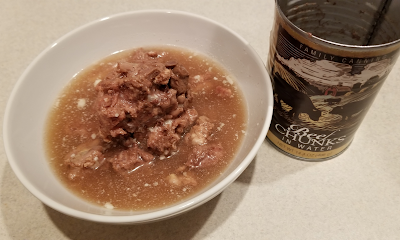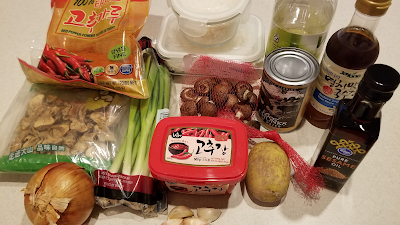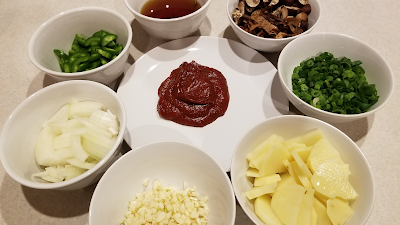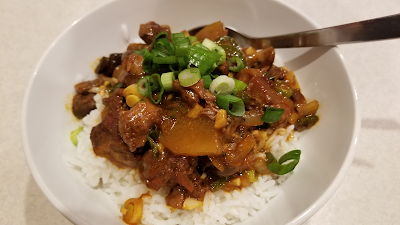So, since February 3rd is Blam This Piece of Crap Day in our household (it can be in yours, too! Try it, it's fun!), I thought it might be worthwhile to show y'all an example of how a piece of crap can be BLAMmed up into something better.
 |
| Exhibit A: canned beef chunks in water. |
I've had these canned beef chunks in our food storage for quite some time. While they are not horrible by any means, they tend to look rather off-putting when they first come out of the can, like something you might feed to a dog.
(Foties from here on out by Captain Midnight. Thanks, honey!)
 |
| Here, Fido |
Appearance, however, isn't as important as taste. See, this canned beef was designed to be part of a long-term food storage solution. I want to use it up before it loses significant nutritive value. Canned meat works fine in any application that might use leftover cooked meat; it makes decent chili, for instance. But at this point in its shelf life, canned beef often tastes more like can than beef. If you make beef enchiladas out of this, you will taste the canned flavor. If you make deviled meat for sandwiches, you will taste the canned flavor.
I do not want to taste that can. I do not like it, Sam-I-Am.
So whatever I make with this will have to be flavorful enough to defeat the taste of the can.
Fortunately, I know just the thing, because I watch the Future Neighbor channel on YouTube. I'm gonna BLAM this can into a spicy red-pepper-based stew over rice!
 |
| Ingredients assemble! |
For those of you who are Korean or who cook Korean on the regular, yes, this is an adaptation of gochujang-jjigae. Yes, OF COURSE it tastes better with fresh beef/pork/chicken and otherwise more authentic ingredients. But it was surprisingly delicious just using up what I had. (In fact, to complete this dish, I had to buy exactly one item from the store: a jalapeño pepper. I thought I had one, but it had been sitting in the fridge too long and had started growing its own little civilization, and eating volunteer mold is never a good idea.)
Not shown: the pepper I had to buy and some soy sauce, because, um, I forgot this recipe had soy sauce. I did add it later.
In addition to the beef chunks, there was a handful of mushrooms of questionable provenance which I wanted to use up, as well as some leftover rice and a rather sad-looking old potato.
Let's do this.
 |
| Mise-en-place |
In the center: gochujang, a traditional Korean fermented red pepper paste with tons of fabulous flavor. Around it: half a white onion, the aforementioned jalapeño, mushroom soaking water, mushrooms, green onions, the peeled and thinly sliced potato, and about 2 tablespoons minced garlic. Oh yeah.
 | ||
| Let's drain and rinse those beef chunks. They look better already. |
Time to put a wok or other large saucepan over low to medium-low heat, and add some neutral cooking oil and some sesame oil. It immediately starts to smell good.
When the oil is hot, you slide in the gochujang paste and cook until it starts bubbling and changing the color of the oil. Mmmm. Then you throw in about a tablespoon of gochugaru (red pepper flakes)...
 |
| Mmm, gochujang broth. |
...and immediately follow that with a few cups of water (we added the mushroom soaking liquid to this), bringing the whole thing up to a boil.
 |
| Bubbling broth! |
Here you add the potato, garlic, some soy sauce and some fish sauce. If we'd been using fresh beef, this is where we would have added that -- but since canned beef is so soft it will fall apart if you look at it too long, we decided to wait until later in the cooking process to fling it in.
This bubbles away for about 5 minutes, letting all the flavors get to know each other and giving the fish sauce some time to settle down.
 |
| Getting chunkier |
At this point you add the white onion, mushrooms and jalapeño. Bring it back to a boil...
 |
| And into the drink they go! |
...add the beef chunks, gently stir to break them apart, and let the stew bubble for another 7 to 10 minutes, or until the potato pieces are soft enough to eat.
 |
| Is it stew yet? |
When the potatoes are soft, sprinkle over some of the green onions, turn off the heat and let the stew sit for 10 minutes to allow the flavors to relax. Check for seasoning -- if it's too salty, add a splash of water.
 |
| Done! |
The stew is now complete. Heat up your rice and plate that thing up.
 |
| All ready to eat |
Put rice in bowl. Put stew on rice. Put green onions on stew.
Put spoon in bowl. Put spoon in face. Repeat until gone.
 |
| Nom. |
And that, my friends, is how you BLAM a piece of crap.

2 comments:
Thank you for that Sooz - I admit the the tinned beef put me off at first, but reading through the recipe, I think I may try this one day - if I can source the pepper paste, I’m rather intrigued by the initial frying method too.
If you're interested in giving it a go, here's a link to the original recipe at futuredish.com. If you like things spicy, it is super delicious. And it really is better with fresh beef; I was just trying to find another recipe that would help us use up the canned stuff as painlessly as possible. This definitely fit the bill.
Even though they're a centuries-old part of Korean cooking, gochujang and gochugaru are having a bit of a moment in the USA. I think part of it has to do with the fact that, after months of home cooking, people are getting tired of making the same old recipes, so they're branching out.
Post a Comment